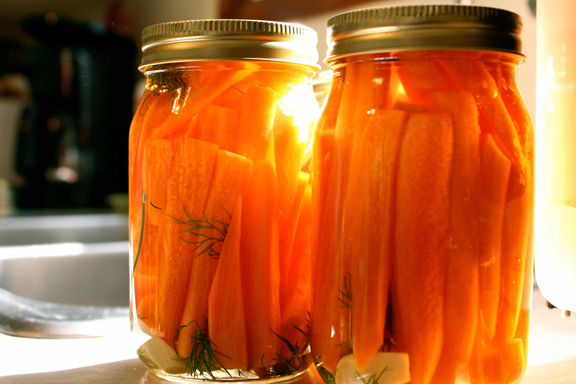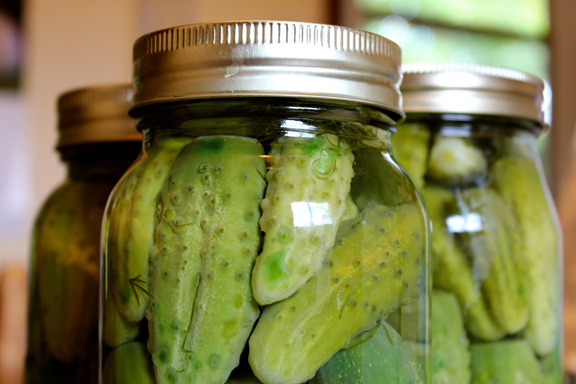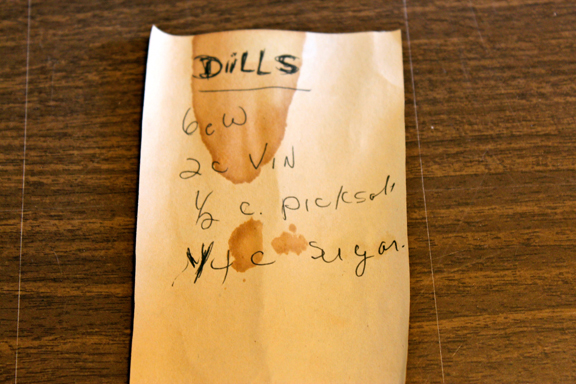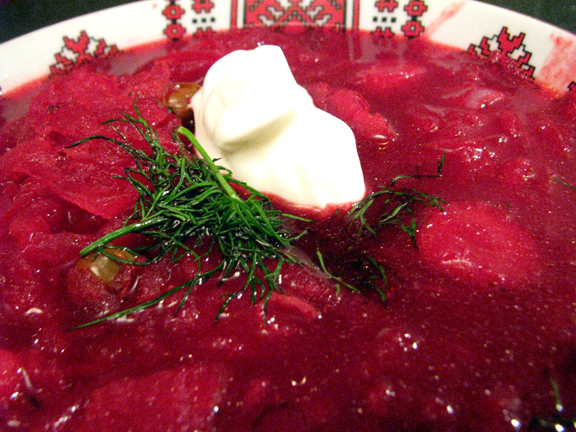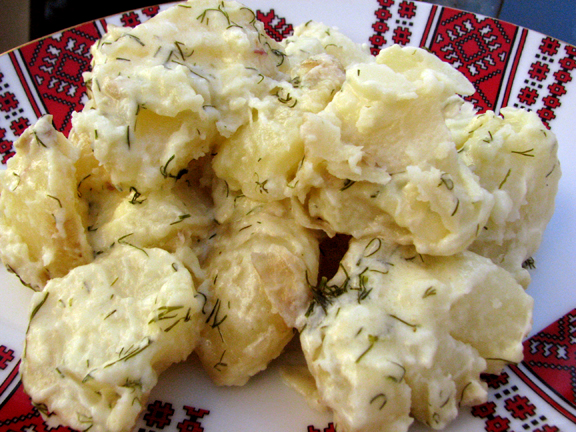I can’t believe September is already here. The weather is getting a little cooler and our family garden in Saskatchewan is slowly winding down. While I was visiting Claudia on her holidays in August, we had the opportunity to do some canning. (more…)
Dill Pickles
Last weekend, I had the opportunity to visit Claudia and her lovely garden in Saskatchewan. We have had an unusually hot and dry summer here on the Prairies. This has been a welcome change for our vegetables, as the past few summers have been wet and, quite frankly, miserable. The abundance of cucumbers, carrots, potatoes and onions made capturing some of Claudia’s recipes simple and fun. There is nothing like using fresh ingredients from your backyard.
When I walked into the house after the 5 hour drive from Winnipeg, I noticed something on the fridge. I took a picture of it (above). This simple piece of paper is the reason I started this food blog. This is Claudia’s recipe for Dill Pickles. Yes, just the ingredients for the brine. No instructions, no laminated paper, nothing. Just her coveted recipe scribbled on an old piece of worn paper. I knew I had to post this delicious recipe for the best dill pickles you will ever have immediately!
Borsch
Well kids, you don’t get any more Ukrainian than this. Borsch – i.e. Beet soup. Whatever you want to call it, it doesn’t change the fact that it’s one of the most traditional and delicious recipes my Mother inherited from her own Mother (my Baba).
Claudia typically makes Borsch mid-to-end of summer when there is an abundance of beets in our garden in Saskatchewan, and on every holiday occasion (Easter, Thanksgiving, Christmas). For a recipe that is relatively simple to make, there are so many variations around. I am pretty certain I’m biased, but this one is truly the best out there.
Growing up we always had meat in our Borsch – usually boiled chicken or pork. I don’t know about you, but I’ve never been a boiled meat kinda girl. So when I got old enough and decided it was time to throw a fuss, Claudia only served this vegetarian-style Borsch recipe to our family. Yes, I am a spoiled princess. But I’m still right – this rendition tops the meat varieties any day.
Dill Potatoes
This particular recipe caused a lot of different philosophical cooking debates between myself and Claudia. The largest being that young garden potatoes should only be used in this recipe. ONLY THIS RECIPE. I learned this the hard way when Claudia called me up last week to tell me she dug out some “nice young potatoes” from our garden in Saskatchewan. When she told me this I was quite happy, as I had my eye on this great potato salad recipe that I wanted to make for her and my Dad the following week. BIG mistake. BIG. A mere two seconds went by after the words “use these young potatoes for potato salad” flew out of my mouth when Claudia interjected with one word – “No”. Being quite a stubborn daughter and fond of debate, I then asked her why I couldn’t use the “young garden potatoes” for my potato salad. Her answer (said in a sarcastic ‘well aren’t you a piece of work’ response – quite possibly rolling her eyes at me): “Because, young potatoes are for dill potatoes only.” Fair enough Mom, fair enough.
Dill potatoes are very common in Ukrainian households. Maybe it’s because potatoes were a staple on the farm or in gardens. Probably because it was dirt cheap (no pun intended) to grow and cook with in general. Either way, they are so simple to make, yet so comforting and delicious. Best in summer when you have “young potatoes” and fresh garden dill. Now, when I asked Claudia her definition of “young potatoes” for this post, I didn’t get a really clear, definite answer. Essentially, they are potatoes that are pulled out of the ground at an earlier stage and not left to fully mature. P.s. they are delicious!

